You may wonder, considering how disappointed I was by Peter Jackson's Lord of the Rings movies, why we decided to go see The Hobbit Saturday night. But we had a free movie pass that was about to expire; moreover, I was feeling more kindly toward the LOTR movies, having watched my nephew spend much of his Christmas vacation devouring the books—which I doubt he would have done without having been inspired by the movies. So last night we ventured into our local theater for the first time in nearly five years.
Yes, we were disappointed. Peter Jackson is consistent, and so am I. I could very nearly simply quote my review of The Fellowship of the Ring for The Hobbit. I fault it for the same lack of attention to the basic nature of the characters (though not as badly as in LOTR), the same gratuitous rewriting and addition of scenes, the same modern-action-film-with-swords emphasis on battles and chase scenes. In the middle of a fight that wouldn't end, Porter and I looked at each other and said, "b-o-o-o-r-i-n-g." So sad to feel that way about a movie made to honor one of my very favorite books, one I can read over and over again without coming close to boredom.
I'd read that The Hobbit movie was not intended to simply tell the story in the book, but would have some scenes added to include some of the backstory and tie it in more directly with LOTR, and I was okay with that. That's not at all the same thing as directly contradicting the book, which, for example, the eagle rescue scene does in spades.
As in the previous movies, this one does hobbits and the Shire best: believable, beautiful, noble, inspirational. The other races are more caricatures and too alien. The character of the dwarves (that's the way the word is spelled in the book, complete with explanation) is downright maligned. Radagast is played as a drug-crazed hippie; elves are wrongly cast as vegetarians. The trolls, goblins, orcs, and wargs are over-the-top in their ugliness and puerility, so that they come across as more disgusting than evil. On the other hand, Gollum, though not the character as I imagined him, is very well conceived and acted (as he was in the other films).
There are some good lines, and some funny ones, though too much of the humor is of the snot-in-the-soup kind.
I've said before that an important key to good fantasy is that if you want the audience to accept an outlandish premise (e.g. magic), the rest of the story must be down-to-earth and believable (minus the magic, Hogwarts is a normal English boarding school). Watching the credits, I commented that it sure takes a lot of people to make a movie. With all those folks, couldn't they have sprung for two more? A physicist and an EMT come to mind. When big things fall or are thrown they look too much like models (with modern CGI there's no excuse for not doing better), and even dwarfs, to be at all "realistic," can't fall a few hundred feet, have massive timbers land on top of them, then get up and go about their business with no more than a brief groan.
Would I recommend The Hobbit movie? Only for those who aren't likely ever to read the book. I definitely wouldn't recommend it for grandchildren. The PG-13 rating is well deserved (and frankly I don't think anyone, of any age, can benefit from so much violence).
Still, it has its good points, and I have to keep in mind how much stronger it is, even in its weaknesses, than most contemporary fare.
The best of the movie? Bilbo and the Shire, the music (though it owes a lot to Braveheart), and the awesome New Zealand scenery.
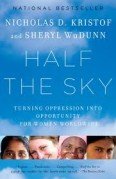 Half the Sky: Turning Oppression into Opportunity for Women Worldwide by Nicholas D. Kristof and Sheryl WuDunn (Alfred A. Knopf, 2009)
Half the Sky: Turning Oppression into Opportunity for Women Worldwide by Nicholas D. Kristof and Sheryl WuDunn (Alfred A. Knopf, 2009)
Inspired by the PBS documentary and the recommendation of a friend, I put myself on the library waiting list for Half the Sky. As usually happens, it became available at an inconvenient time, and I had to return it to the library in a hurry. That was back in October, so I'm trying to craft this review from my hastily-scribbled (typed) notes and quotes.
The book is better than the television show, if only because it features fewer American pop-culture icons and more real people. It also, of course, gives more detail, though there is something to be said for the visceral effects of seeing and hearing the people behind the words. Both left me with two distinct reactions, neither of which is probably what the authors had in mind.
When reading (or watching) these stories of unbelieveable brutality and oppression of women, the first, and no doubt intended, reaction is, "What are we doing to our women and girls, to the majority of the population of the world, to half of the very image of God?" Particularly since the authors relate all these horrors while barely touching on the problem of sex-selective abortion. And yet my lasting impression followed almost immediately: What have we done to our men and boys? Not everyone will agree, but I say that there is something even worse than the atrocities committed upon these women, and that is being the kind of person who commits such acts. Ultimately, no solution to the problem of violence against women will succeed unless the rehabilitation of men is also addressed.
Not that women, as a sex, are innocent:
In talking about misogyny and gender-based violence it would be easy to slip into the conceit that men are the villains. But it's not true. Granted, men are often brutal to women. Yet it is women who routinely manage brothels in poor countries, who ensure that their daughters' genitals are cut, who feed sons before daughters, who take thieir sons but not their daughters to clinics for vaccination. One study suggests that women perpetrators were involved, along with men, in one quarter of the gang rapes in the Sierra Leone civil war.
But by and large, men have the power, and they use that power in ways that hurt women, even their own wives and daughters.
Some of the most wretched suffering is caused not just by low incomes, but also by unwise spending—by men. it is not uncommon to stumble across a mother mourning a child who has just died of malaria for want of a $5 mosquito net and then find the child's father at a bar, where he spends $5 each week. ... Roughly 7 percent of the total spending of the poorest people in Indias's Maharashtra State went to sugar. ... [I]n much of the world even some of the poorest young men, both single and married, spend considerable sums on prostitutes. ... [A]t least in Udaipur, the malnutrition could in most cases be eliminated if families bought less sugar and tobacco. ... If poor families spent only as much on educating their children as they do in beer and prostitutes, there would be a breakthrough in the prospects of poor countries. Girls ... would be the biggest beneficiaries.
Or, as my son-in-law succinctly put it, "Men can't be trusted to bring home the bacon rather than eating it on the way home."
Why not? Why is it that when women in poor countries get jobs, they use the money to feed and educate their children, but men spend their incomes (and their wives', if the money isn't hidden from them) on beer, cigarettes, and prostitutes? It was (is) not always thus: men used to be proud to support their families, and many still are. Perhaps in this country one can cast some blame on feminism, which robbed men of the assurance that their own sacrifices were essential to their families' survival. But in many poor countries little of the bread ever made it to the children's mouths until their mothers began earning it. Here's one theory:
[Quoting David Landes, the eminent Harvard historian] The economic implications of gender discriminaion are most serious. To deny women is to deprive a country of labor and talent, but—even worse—to undermine the drive to achievement of boys and men. One cannot rear young people in such wise that half of them think themselves superior by biology, without dulling ambition and devaluing accomplishment.
(On a side note, while I applaud the movement in some Christian circles to encourage boys and men in chivalry, graciousness, and love, I cringe when I see how often this is taught through the idea that boys are superior to girls—sometimes even to the extent of being stronger and wiser than their mothers! As Landes said, this is not only harmful to their mothers and sisters, and future wives and daughters, but to the boys themselves. Here's an article I ran into recently that addresses a related problem, and has the lovely title, Why You Should Stop Treating Your Husband Like a Toddler, and ACTUALLY Respect Him.)
On the bright side, as men see the economic potential and power of their wives, they often come to respect them more, and then see the value in educating their daughters. On the other hand, there's a clear risk that they will only see the economic value, and women will find themselves further enslaved, working at a job, running the household as usual, and funding their husbands' bad habits as well.
Half the Sky rightly celebrates the efforts of women worldwide to address the problem of their own oppression, but it will take both men and women, working together, to address the heart of the tragedy.
I'll leave my second, and quite different, take-away from Half the Sky for another post. I was going to add some more quotes, but as they, too, are on a different subject, so that will make a third post—a record for one book review, I think.
asdf
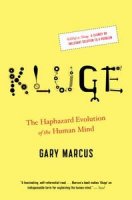 Kluge: The Haphazard Evolution of the Human Mind, by Gary Marcus (Mariner Books, 2008)
Kluge: The Haphazard Evolution of the Human Mind, by Gary Marcus (Mariner Books, 2008)
After reading Kluge, which only made my reading list because the author's Guitar Zero was unavailable, I'm all the more anxious to read the book that so impressed my daughter, because I found this one decidedly unimpressive.
I'll admit my prejudice up front: Unless I've chosen a book for it's religious content, I don't like books that wear their faith ostentatiously. Example: A robust and glorious Christian faith shines better through every corner of J.R.R. Tolkien's Middle Earth, without any direct mention of God, than the in-your-face faith of much of the "contemporary Christian fiction" genre. Kluge makes this error loudly and heavily, and if it hadn't been for Janet's enthusiasm for Guitar Zero, I might have given up on Kluge. To be honest, though, I have a terrible time dropping a book even if I've determined it isn't worth my time, on the thought that despite all appearances, the book just might get better. And I'm glad I stuck with Kluge.
It's best, I think, to think of it as two parallel books. One is Marcus's attempts to explain the quirks, foibles, imperfections, and out-and-out breakdowns of human mental systems, as failures of evolution. Simply put, evolutionary processes, although able to produce remarkably functional, successful, and even beautiful organisms, usually stop short of the best. With evolution, "good enough is better than perfect," and if a system works well enough to give a reproductive advantage, eons of selection are not likely to be unravelled even if a future organism would do better with a fresh start. Thus as life evolves, new systems are layered on old ones, and the layers do not always interact in the most efficient manner. The human brain is a "kluge," cobbled together from from parts as old as life and as recent as yesterday, and in human behavior, the rational, thinking part of the brain is often overruled by more primitive reactions. I'm not doing justice to his thesis, but that's the gist. This is the book I thought I was going to be reading, and like Made to Stick, is a good look at why we're not as rational as we think, how this weakness can be used by others to our detriment, and what we can do to mitigate the situation.
The second "book" is a fascinating view into the mind of a materialist. I don't mean "materialist" in the sense of "consumerist," one who is driven by material desires, but one whose world-view is materialism ("a theory that physical matter is the only or fundamental reality and that all being and processes and phenomena can be explained as manifestations or results of matter"). This is the in-your-face religion that I object to, and it begins in the second paragraph of the first page:
If mankind were the product of some intelligent, compassionate designer, our thoughts would be rational, our logic impeccable. Our memory would be robust, our recollections reliable. Our sentences would be crisp, our words precise, our languages systematic and regular....
And in the penultimate chapter:
It seems safe to say that no intelligent and compassionate designer would have built the human mind to be quite as vulnerable as it is. Our mental fragility provides yet another reason to doubt that we are the product of deliberate design rather than chance and evolution.
This theme is repeated ad nauseam throughout the book: If I were creating the world, I would have done X; since what I observe is Y, then there is no design and no designer (with or without evolution as part of the process). Naturally, I rattled off several alternatives to his "my way or no way" argument with almost no thought at all. (The world was created by a designer whose idea of the best design is different from his; the design was initially perfect but was later marred by other forces; there is/was a designer, but one who is not compassionate; it shouldn't be hard to come up with others.)
As put off as I initially was, this is actually as interesting as the other part of the book. It was fascinating to see the world through the mind of one for whom evolution is not merely a mechanism, but a religion. In many ways, Kluge is a remarkable attempt to make evolution answer the question that all religions and philosophies must wrestle with: sin. Of course Marcus does not call sin by that name, but that's what he's dealing with nonetheless.
To be human is to fight a lifelong uphill battle for self-control. Why? Because evolution left us clever enough to set reasonable goals but without the willpower to see them through.
In fact, Marcus deals with many of the great questions of mankind, and I find that commendable, even if some of his attempts to force answers out of evolution seem to me as stretched as the ancients' adding sphere upon sphere and complication upon complication in order to account for the motions of the heavenly bodies without considering that the earth might revolve around the sun. Marcus wants a consistent, definitively explainable system—a desire as old as Job.
As interesting as his theories are, I don't like Marcus's ideal world. He's much too enamored of computers, and repeatedly asserts that our minds are obviously defective because they don't work the way he would design them—like computers. I like that our language is sometimes ambiguous, irregular, and unsystematic. I'm glad I'm human, and not Vulcan.
Most of all, there seems to be no place in his ideal creation for free will (another difficult concept for any religion), which I believe explains much of the gulf between the intelligent, compassionate creator and the all-too-visible faults of the world we know. It is also the capacity which—more than toolmaking, more than language, more than intelligence and the ability to reason—makes us truly human.
One thing that had impressed Janet with Guitar Zero was Marcus's humility. Since I didn't notice that at all—"God should have done things the way I would have" is not exactly a humble attitude, and neither is "if you don't agree with me, there's something wrong with your brain"—I'm left wondering if it's a matter of personal growth over time (Kluge is the earlier book by four years), or the difference between his attitude toward something he knows he knows nothing about (music) and that toward his field of expertise (psychology). Certainly Kluge has one significant mark of humility in my mind: On the cover of the book the author is identified as simply "Gary Marcus." I am not impressed by the habit of many authors of putting all possible letters prominently after their names: John Doe, Phd, MD, LLD, etc. Credentials are a good thing (Marcus is identified on the back cover as "a professor of psychology at New York University and the director of the NYU Child Language Center"), but I see no useful purpose in boasting about one's degrees on the front cover.
A couple of random quotes:
[Humans tend] to believe that what is familiar is good. Take, for example, an odd phenomenon known as the "mere familiarity" effect: if you ask people to rate things like the characters in Chinese writing, they tend to prefer those that they have seen before to those they haven't. Another study, replicated in at least 12 different languages, showed that people have a surprising attachment to the letters found in their own names, preferring words that contain those letters to words that don't. One colleague of mine has even suggested, somewhat scandalously, that people may love famous paintings as much for their familiarity as for their beauty.
Scandalously? Not at all. I thought it was obvious, and in large part a good thing, that familiarity with a subject increases appreciation which increases the desire to learn more which in turn increases familiarity. It's a blessed cycle, unless there's something bad about the subject itself. Isn't that a great deal of what parenting is all about, helping our children become familiar with, and thus inclining their hearts toward, the good, the true, and the beautiful?
Pay special attention ... to what some economists call "opportunity costs"; whenever you make an investment, financial or otherwise, ponder what else you might be doing instead. If you're doing one thing, you can't do another—a fact that we often forget. Say, for example, that people are trying to decide whether it makes sense to invest $100 million in public funds in a baseball stadium. That $100 million may well bring some benefits, but few people evaluate such projects in the context of what else that money might do, what opportunities (such as paying down the debt to reduce future interest payments or building three new elementary schools) must be foresworn in order to make that stadium happen. Because such costs don't come with a readily visible price tag, we often ignore them. On a personal level, taking opportunity costs into account means realizing that whenever we make a choice to do something, such as watch television, we are using time that could be spent in other ways, like cooking a nice meal or taking a bike ride with our kids.
There's a lot more in Kluge I could talk about, but I'm thinking about opportunity costs now, so I'll stop here.
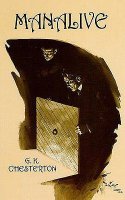 Manalive, by G. K. Chesterton (Dover, 2000, originally published in 1912 by the John Lane Company)
Manalive, by G. K. Chesterton (Dover, 2000, originally published in 1912 by the John Lane Company)
Orion is upside down.
My first view of the Southern Hemisphere sky; floating above a seemingly infinite abyss while snorkeling through crystal-clear water; reading C.K. Chesterton’s Manalive. Awestruck, weak-kneed, disoriented, and just on the edge of fear. How can I review a book that reviews me?
Reading Chesterton can be a lot like trying to drink from a waterfall. I know I’m in the presence of a mind and a spirit much greater than my own. There’s wordplay and swordplay; there are twists in the logic and logic in the twists. It’s like riding a well-designed roller coaster, or skiing down a slope that’s just beyond your skill level.
I hear you muttering through your clenched teeth: “Get on with it! What is the book about?” In a phrase: the joy of being alive.
Okay, okay. From the back cover:
Innocent Smith … is taken up by a fierce wind one day and dropped on the lawn of a boardinghouse inhabited by a group of disillusioned young people. … In the course of the book, Smith courts and remarries his wife repeatedly, lives in various houses, which all turn out to be his own, and attempts murder, but only succeeds in firing life into his victims. … Manalive is full of high-spirited nonsense expressing important ideas: life is worth living, one can break with convention and still maintain moral and ethical standards, and much of the behavior that civilized man has been led to believe is wrong, isn’t wrong at all.
That’s about as good a summary as you’re going to get, though it is rather like trying to learn what a roller coaster is by consulting Merriam-Webster: an elevated railway … constructed with sharp curves and steep inclines on which cars roll.
You have to brave the ride.
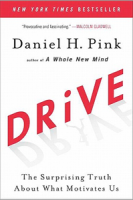 Drive: The Surprising Truth About What Motivates Us by Daniel H. Pink (Riverhead Books, 2009)
Drive: The Surprising Truth About What Motivates Us by Daniel H. Pink (Riverhead Books, 2009)
Drive is yet another book I read because it was on my son-in-law's Amazon wish list. We gave it to him for Christmas, and I hope he reads it soon so my daughter can read it, too. Although the focus of the book is on motivation in business, the material is widely applicable, and I find it exciting.
I had barely begun the book when I exclaimed to myself, "Published in 2009? This is news? It sounds exactly like what we learned a decade ago from Edward Deci and Richard Ryan." That was at a University of Rochester "Meliora Weekend" of lectures and seminars. I looked up my journal entry from the time, to be certain:
Our next stop was the chapel, for “Your Personal Freedom” with Edward Deci and Richard Ryan, U of R psychology professors who are world renowned experts on autonomy and human motivation. I found them fascinating, much more so than I’d expected. From them I heard what I’d only heard before in Alfie Kohn’s Punished by Rewards, that rewards as well as punishments destroy intrinsic motivation. They cited one experiment in which people were paid to do what they enjoyed doing, and were doing without pay, but then stopped doing once the pay stopped. I spoke with them afterwards about Punished by Rewards, which they said is based on their research, only is a bit too polemic, too one-sided, missing out on the positive values of encouragement, but otherwise true. I surprised myself by having the courage to speak up during the question and answer session. They had talked a lot about motivation in schools, but never mentioned homeschooling. Since I’m convinced that one of the best things about homeschooling is that so many home educated children develop strong intrinsic motivation, and a great love of learning, it seems to me an important phenomenon to investigate. To my surprise, they have not studied it at all, and while they seemed to agree with me about the intrinsic motivation of homeschoolers, they were very cautious and seemed hesitant to appear to endorse homeschooling in any way.
I was so impressed, in fact, that I later bought Deci's book for laymen, Why We Do What We Do.
Sure enough, Pink quotes and references Deci and Ryan, Alfie Kohn, and others whose research was done even earlier. But Drive is invaluable not only because he ties all the research together and extends it, but because despite the very clear and well-established case for the superiority of intrinsic motivation and the negative effect of "carrots and sticks" on motivation, engagement, and especially creativity, no one is listening. Well, not no one, but very few. Pink sites some encouraging news from forward-thinking businesses, and he does not neglect the example of homeschoolers, particularly their unschooling subset.
The only thing I found annoying about Drive was Pink's repeated use of the phrase, "The science says..." in exactly the same manner some people aver, "The Bible says...." Overdone, either weakens the case being made.
Other than that, I have nothing negative to say. It's a great book, full of even greater ideas. I wish there were more practical examples in non-business areas (homemaking, childrearing, homeschooling), but that's not the book Pink was writing. There may be more online if I dig a bit.
I read the book in a hurry, so there are no quotations for you this time. Perhaps the above-mentioned son-in-law will come through; he does a better job with that than I do, anyway. Here, however, is a Dan Pink TED talk to get you started:
Mea culpa! It's been nearly a year since my post about Stephan's Dots book (numbers in four languages), and I never did update it with Joseph's response. It was an immediate hit, and is still one of Joseph's very favorite books.
Here are a few videos showing Joseph and the book in action:
The book has proved very durable under heavy use, and if the $70 cost seems extravagant, I'd say Joseph has definitely gotten his parents' money's worth already.
Update 10/16/19: As has happened with several old posts containing videos, I'm pretty sure a chunck of the post between the video and the final sentence was accidentally removed in the process that switched the videos from Flash to <iframe>. Someday I may try to recover them ... but realistically, probably not.
Permalink | Read 2945 times | Comments (4)
Category Reviews: [first] [previous] [next] [newest] Education: [first] [previous] [next] [newest] Children & Family Issues: [first] [previous] [next] [newest] Everyday Life: [first] [previous] [next] [newest]
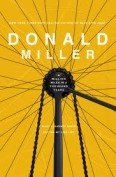 A Million Miles in a Thousand Years: What I Learned by Editing My Life by Donald Miller (Thomas Nelson, 2009)
A Million Miles in a Thousand Years: What I Learned by Editing My Life by Donald Miller (Thomas Nelson, 2009)
I started (mentally) writing this review when only a few pages into the book. The review began something like this:
Given which of us is the famous author and which is not, it would not be wise to say Donald Miller can't write. But what is definitively true is that, whether he can or not, he doesn't write in a style that I enjoy reading. It's narcissistic, informal bordering on stream-of-consciousness and slangy bordering on vulgar. Considering the endorsements from big-name Christians (Jim Wallis, Brian McLaren, Rob Bell, Gary Haugen, Max Lucado) I was expecting a little less nonchalance about casual sex, drug use, smoking, and nihilism. And it jumps around like one of those modern movies where you don't know what's real and what's not, what's then and what's now.
Before I met the filmmaker guys, I didn't know very much about making movies. You don't think about it when you're watching a movie, but there's a whole world of work involved in making the thing happen. People have to write the story, which can take years; then raise a bunch of money, hire some actors, get a caterer so everybody can eat, rent a million miles of extension cords, and shoot the thing. Then it usually goes straight to DVD. It's a crap job....
But I like movies. There's something about a good story that helps me escape. I used to go to movies all the time just to clear my head. If it was a good movie, the experience felt like somebody was resetting a compass in my brain so I could feel what was important in life and what wasn't. I'd sit about ten rows back, in the middle, and shovel sugar into my mouth until my brain went numb....
I'd go to the movies because for an hour or so I could forget about real life. In a movie, the world faded away and all that mattered was whether the hobbit destroyed the ring or the dog made it home before the circus people could use him as a horse for their abusive monkey.
Really, how much of that can a reader be expected to take? But there's a reason I finish a book before publishing the review. It gets much better, mostly because Miller eventually starts focusing on things other than himself. (More)
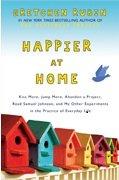 Happier at Home: Kiss More, Jump More, Abandon a Project, Read Samuel Johnson, and My Other Experiments in the Practice of Everyday Life by Gretchen Rubin (Crown Archetype, 2012)
Happier at Home: Kiss More, Jump More, Abandon a Project, Read Samuel Johnson, and My Other Experiments in the Practice of Everyday Life by Gretchen Rubin (Crown Archetype, 2012)
Before I finished The Happiness Project, I knew I wanted to read its sequel. You have to admire a person who can spend a year concentrating on her own happiness and then write a best-selling book about it. Twice. Seriously, I do admire Gretchen Rubin, whose simple-yet-profound ideas are inspirational and potentially life-changing, as I've found those of Don Aslett, Stephen Covey, Malcolm Gladwell, Mary Pride, David Allen, Marla Cilley, John Holt, Glenn Doman and others in my eclectic tribe of inspirational writers. If you're looking for formulas and specific techniques, however, you won't find them here. I read books like this for ideas and inspiration, preferring to throw them all into the mix of my thoughts and see what precipitates. As Rubin herself says, just because something is fun for someone else doesn’t mean it’s fun for you. But behind her approach to maximizing happiness are principles that are as universal as her applications are specific.
Enough review; on to the quotes! (More)
Earthen Vessels: Why Our Bodies Matter to Our Faith by Matthew Lee Anderson (Bethany House, 2011)
It took me much too long to read this book, especially considering I had been looking forward to it. Because the Incarnation—the taking on of human flesh by God, the creator and sustainer of the universe—Christmas!—is a critical distinctive of Christianity, our human bodies should matter to our faith. The Church must not dishonor that which God himself honors so highly. Yet it is all too easy to fall into the common belief that who we "really" are is something unrelated to our physical form. Thus a particularly Christian look at the body should make an instructive and informative book.
Unfortunately, Anderson does not deliver, at least not for me. I was expecting a book that would address the Church as a whole, but Earthen Vessels is specifically aimed at a very narrowly-defined Evangelical (uppercase E), American subdivision. Rather than being a book for all Christians, much too much ink is spent trying to reassure those whom "talking about Lent, Advent, and other seasons makes ... nervous." For them, there is much of substance in Anderson's work. But I imagine Catholics, Anglicans, Lutherans, Methodists, mainline Presbyterians, and many others gritting their teeth and saying, "All right, already! Can we get past Step 1, please?" This is particularly frustrating because the other major flaw of the book is its attempt to cover too much ground. Consumerism, sexuality, tattoos, cremation, vampires, the Sabbath, worship, yoga ... it's too much. Especially for a book of only 231 pages.
On top of it all, I'm always frustrated with writers who assume their readers are conversant with what's shown on television. "We are a nation of people who want to be vampires like Edward Cullen." [Anderson does have the courtesy to explain that Edward Cullen is a character on an American TV show called Twilight.] Excuse me? Never in my weirdest dreams have I desired to be a vampire. I know nothing about the "zombie apocalypse" and care less. My car does not feature "Counting Crows blaring on the radio." Until I looked it up, I had no idea whether Counting Crows was a music group, a song, or a talk-show host. Assumptions such as these lead me to wonder if Earthen Vessels has anything at all to say to me: If his diagnosis is so obviously wrong, why should I trust his prescription?
And why, I wonder, do I find more that speaks to me in books written 50, 100, 500, or 2000 years ago than I do in many of today's writings?
My own dissatisfaction, however, should not condemn the book in the eyes of those who like to count crows, believe in the undead, and/or are made nervous by the mention of Lent. Anderson's logic is not always clear, let alone faultless, but he has some good ideas and puts many interesting and important points on the table for discussion. (More)
We're now into the fourth season of Murdoch Mysteries, and I'm sorry that will be our last season for a while, unless we move to Costa Rica, Papua New Guinea, or some other place in DVD Region Code Four. (I've been an anti-fan of region codes since 2006, when we discovered we couldn't watch our Japanese copy of Swing Girls.)
My new respect for Murdoch Mysteries may have something to do with my disappointment on Except the Dying, the first book of the series on which the TV show is based. Now that I know I like the show's characters and approach better than the book's, I'm happier with it. But it's also true that Season Four toned down the love affair, and though the 21st century social attitudes are still there, so far they haven't been as in-your-face. Most of all, either it has taken a less-serious turn, or I have finally recognized that it's not intended to be an accurate portrayal of late nineteenth century Toronto—or anyplace else. In its use of of modern technology it is more like the old TV show The Wild, Wild West, or maybe A Connecticut Yankee in King Arthur's Court, though it's been a long time since I've seen the one or read the other, so my memory may not be quite accurate.
In any case, I'm finding easier to take the show for what it is, and enjoy it. Especially the way it laughs at its own anticipate-the-future tricks. While Murdoch invents gadgets to help catch criminals, George Crabtree—still my favorite character by far—is always seeing a different side. Murdoch builds a complicated house model to help him picture the movements of the suspects, complete with conservatory, library, hall, potential weapons, and a token for each person. All he sees is the crime, but Crabtree recognizes the potential for a great new board game.
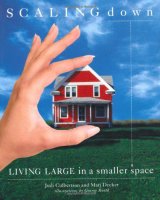 Scaling Down: Living Large in a Smaller Space by Judi Culbertson and Marj Decker (Rodale, 2005)
Scaling Down: Living Large in a Smaller Space by Judi Culbertson and Marj Decker (Rodale, 2005)
Prepare NOW; don't let the headache of dealing with your estate be your children's last, vivid, and painful memory of their parents.
A good friend has recently been embroiled in our generation's nightmare: moving her widowed mother out of her house-of-many-years and into assisted living, then having to clear out the house and sell it. (Thank you, Dad, for having made the process as easy as it gets, and to all my siblings for staying friends and even having some fun through it all.) Scaling Down is one of two books she recommended; it was available in our library, so I decided to check it out.
I wasn't expecting much, having already dealt with that heart- and headache. And if you're like me, you'll almost give up in the first chapter, where you're asked to write a "mission statement." But hang in there; the book's about a lot more than selling the old homestead, and you can easily ignore the annoying bits. Anyone who is merging two households, moving into a smaller space—or moving, period—fending off sibling rivalry over Grandpa's Kitchenaid mixer, or simply feeling overwhelmed by "stuff," can benefit from the book's suggestions.
One thing that differentiates Scaling Down from other decluttering books is the authors' sympathy for the emotional complications attached to our belongings. Although they are very practical and sometimes in my judgement a little too harsh in their methods, they do provide some helpful ideas for keeping the feeling and/or memory without keeping everything. Collectors, for example, are not asked to give up their collections, but to be wiser in their collecting: financing quality by selling off quantity.
The chapter headings:
- How Did We Get Here?
- I Need to Do This But...
- But Aunt Winnie Gave It to Me!
- Collaring the Paper Tiger
- The Tyranny of Collections
- The Secret Live of Clothing
- Clearing Out Your Family Home
- Your Cuisinart or Mine?
- Moving in a Hurry
- The Saga of the Rain Bonnets
- Finding Good Homes [for your stuff]
- "This is Your Life!"
- Shop Till You Drop ... Out
- How to Keep from Cluttering Your New Place
- Starting a New Adventure
- Using Your Space for You
Did you catch "How to Keep from Cluttering Your New Place"? I know from painful experience that without the exercise of an iron will, bigger refrigerators, bigger closets, and bigger homes all soon become just as crowded as the smaller counterparts they replaced.
Another surprising, but potentially life-changing idea is expressed by the last chapter: Using your space for you. Actually, it's a major theme throughout the book: You stuff, from clothes to cupboards to collectibles, should be what pleases you, what makes you feel comfortable and happy, what works for the vision you have of what your home should be. Quantity rarely provides that, but we keep buying things for all the wrong reasons, having never taken the time and effort to discover what we really like. I suppose that seems obvious, but there are a lot of things I keep for no reason other than that I have them, and they work. We still have the kitchen wallpaper that was there when we moved in, even though I'd never have chosen it out of a wallpaper book. I don't think that's all bad—and I still dread the idea of even looking through a wallpaper book, let alone tearing up my kitchen—but the authors do have a point. And I do like their answer to this objection:
"I don't want to make any changes that would hurt my home's resale value."
This statement strikes us as sad. It is similar to someone buying a new car, then saying, "I'm only going to drive it when my other car is in the shop, because I want to keep the mileage low for the trade-in." That attitude makes you the caretaker of the property, keeping it nice for some future owner, instead of behaving like it's yours. If you've always dreamed of a vaulted-ceiling library, and your garage is the perfect place to create one, why not do so? You'll have years of pleasure, and if you or your heirs get a little less because it's too nice to park a car in, your satisfaction is worth the difference. Most of the time individualizing a space actually adds to the selling price. But even if it doesn't, don't sell yourself short.
I won't be buying the book, at least not yet. But I'll keep it in the back of my mind, and might get it out again when I need to be re-inspired. Not only is an organized, uncluttered home one of the best legacies we can leave our heirs, it also makes life a lot nicer in the meantime.
We watched the first half of the PBS documentary Half the Sky last night. (Quarter the Sky?) The conclusion is tonight. I highly recommend it, but not for grandchildren. Here's the trailer.
The shows will be available for one week at PBS video (maybe not in Europe, sorry). Here is the link for Part 1. I'll update with Part 2 when it is released, which should be tomorrow. And here's Part 2.
Note on flu shots: This year they're pushing the intradermal shot. Personally, I think it's because they can use a lower dose, and therefore make the supply go farther. But they're hyping it as less painful ("90% smaller needle"). No matter how many times I told him needles don't bother me ("I gave blood yesterday!"), the nurse practitioner who administered the shot kept emphasizing the small needle and consequent reduced pain.
Based on a sample size of two, I'm here to say that that is bunk. Both Porter and I agreed that the intradermal shot hurt more than a regular injection, not less. I hope our grandkids appreciate the sacrifice. :)
Last Saturday was the opening concert for the Orlando Philharmonic's 20th Anniversary season. Pausing only briefly to wonder how the "new kid on the block" can be twenty years old already—I've done that several times already, the latest being only last month, with the first of our nephews to leave the teenage years behind—I'll just say that Maestro Christopher Wilkins once again began the season with a blockbuster program guaranteed to fill the house. One work: Mahler's Third Symphony. No intermission. Nearly 110 minutes long. The first movement alone is longer than the entirety of Beethoven's Fifth. The orchestra did a great job, but I have to say that they were upstaged by the members of the Florida Opera Theatre Youth Program. Some of those kids were as young as seven, they were highly visible on a platform well above the orchestra, the part that they had to sing was brief and late in the symphony, and they did not fidget. They sat still, they kept their hand in their laps most of the time, and they at least appeared attentive. In short, they did better than me.
I was not familiar with Mahler's Third; it's not programmed often, and I can see why: the orchestra is much larger than that required for most performances, and there's a large chorus as well. E-X-P-E-N-S-I-V-E. I'm glad the OPO took the plunge to offer it. I do have to say, however, that—unlike Mahler's First, which was love at first hearing for me—this one may take a little more exposure for me to appreciate. I found most of the movements reasonably enjoyable, but the sixth and last was interminable. I don't think that had to do with the fact that we'd been sitting for so long as that to my ears it didn't seem to get anywhere. Slowly.
Still, it was a good experience, quite possibly once-in-a-lifetime. We don't even have a copy of Mahler's Third in our extensive music library, though that of course could be remedied.
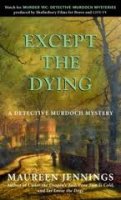 Except the Dying by Maureen Jennings (St. Martin's Press, 1997)
Except the Dying by Maureen Jennings (St. Martin's Press, 1997)
I had been looking forward to reading the first of Jennings' detective stories, the inspiration for the Murdoch Mysteries television series; as I stated in my review of the shows, I'd hoped the book would be less anachronistic than the TV version. In that I got my wish: Except the Dying presents a much more believable view of the seamy underside of late 19th century Toronto. Much to my surprise, however, I plan to continue to enjoy the shows without reading any more of Jennings' other stories.
The movies are perhaps the greater more pernicious lie: the prostitutes are clean and well-mannered; the abortionists are thoughtful, civilized gentlemen; the streets are free of manure and of emaciated children; not a spittoon nor a chamber pot is to be seen. Which is worse, to make the darkness light or the light darkness? The book's lurid detail of evil and filth overwhelms the story, and stains the small glimmers of goodness. How I long for the more restrained writers of the past, who could describe a cesspool without making the reader feel as if he had fallen into it.
Except the Dying is not a terrible book. Jennings writes well, and with more historical accuracy than the TV writers. But as for me, I have had enough. There are more uplifting books waiting to be read.
Whenever I see a title that looks as if it comes from something I feel I should know, I renew my gratitude for Google. (Google the search engine, that is, even though I have mixed feelings about Google the large company.) Except the Dying is from a poem by Emily Dickenson:
The last night that she lived,
It was a common night,
Except the dying; this to us
Made nature different.
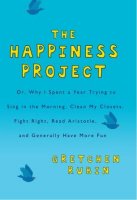 The Happiness Project: Or, Why I Spent a Year Trying to Sing in the Morning, Clean My Closets, Fight Right, Read Aristotle, and Generally Have More Fun by Gretchen Rubin (Harper Collins, 2009)
The Happiness Project: Or, Why I Spent a Year Trying to Sing in the Morning, Clean My Closets, Fight Right, Read Aristotle, and Generally Have More Fun by Gretchen Rubin (Harper Collins, 2009)
Is it selfish to think about our own happiness?
Had this book not been recommended by someone I respect, I'd have given it a wide berth out of just such a concern. And that would have been a sad mistake. Certainly we are now awash in tragedies caused by people seeking their own happiness at others' expense, but as Rubin adroitly demonstrates,
One of the best ways to make yourself happy is to make other people happy;
One of the best ways to make other people happy is to be happy yourself.
No one who regularly reads my reviews will be surprised to hear that I have my points of disagreement with Gretchen Rubin, but they are surprisingly few. Although she bolsters her conclusions with quotes from her extensive research into happiness theory, this book is primarily a highly personal account of the year she spent in the laboratory of her own life. Rubin is a wealthy woman, a best-selling author, and a lawyer who once worked for Supreme Court Justice Sandra Day O'Connor; she lives in New York City, employs a nanny, and likes to collect objects that need to be dusted. Despite the obvious contrasts with my own life, there's much in her discoveries that inspires me.
I highly recommend The Happiness Project—especially for those who have been trained to answer "yes" to the question above. There's a sequel, just released, called Happier at Home, but I'm 10th in line at our library so won't be reviewing that one for a while. However, as with many contemporary books, there's a lot to explore at the Happiness Project website.
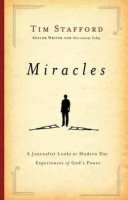 Miracles: A Journalist Looks at Modern-Day Experiences of God's Power by Tim Stafford (Bethany House, 2012)
Miracles: A Journalist Looks at Modern-Day Experiences of God's Power by Tim Stafford (Bethany House, 2012)
Do you believe in miracles? If you believe they've happened in the past (manna in the wilderness, Jesus's resurrection, the healings of Paul), do you think they died out early in the history of the church, or are there miracles today? Why do we talk about "belief" with respect to miracles? Are miracles matters of faith only or can they be tested and proven or disproven? Just what is a miracle, anyway?
I believe that Copenhagen exists. I've never been there, but Porter has. I've seen pictures of Copenhagen, and read about it, and can easily access all sorts of documentation as to its existence. What's more, even if I doubt all these sources, I can hop a plane and end up in a city where the people speak Danish and claim to be living in Copenhagen. (Or not; who knows? I haven't tried it.)
Tim Stafford would like to be able to put the idea of modern-day miracles to the Copenhagen test. Actually, he's been to Copenhagen, as it were, having observed what he considers to be a bona fide miracle of healing in a (formerly) wheelchair-bound friend. But there's a lot of chaff—wishful thinking, outright fraud, and honest prayers that go unanswered—in the miracle wheat field. Many people board the plane and end up in Oslo. Or in the Pacific Ocean.
Stafford, a journalist by profession, examines reported miracles from ancient history to the present, from his own backyard to Mozambique. His investigations are open-minded, and his conclusions open-ended. The evidence for modern-day miracles he finds convincing, but not overwhelming. Moreover, he comes to the counterintuitive conclusion that it is in the very nature of miracles not to be overwhelming.
Here are my takeaways from Miracles:
- Any consideration of the miraculous will be hindered by fuzzy definitions. We confuse the issue by calling a lovely sunset or the birth of a baby a "miracle," when they are in fact marvellous, awesome, but ordinary works of God.
- Most of us, if we don't think about it too much, tend to divide events into the natural (the way the world works, maybe set in motion by God but moving along on its own, explainable by physical laws, whether or not we have discovered them) and the supernatural (direct intervention by God/gods/angels/spirits, not measurable or explainable—miracles). For a Christian, however, that's a wrong way of thinking: the natural, too, is God's present, ongoing work. All healing is God's healing, all life is his, the provision of bread through planted wheat no less from God than manna from heaven.
- Miracles, by Stafford's definition, happen when God does something unusual, or in an unusual way. Dead people do not normally come to life again. Wine-making always begins with water, but in the miraculous version the long process using grape vines and fermentation is side-stepped.
- God acts physically in our material world. That an event can be "explained" by processes we understand, or hope to understand in the future, does not ipso facto mean it is not miraculous. It is the unusual, "signs and wonders" aspect that signals a miracle.
- One often-overlooked property of miracles is that they are rare. If the Bible seems replete with miracles, it's because it covers a long time span. They are also unevenly distributed, with some peak times when miracles are more frequent being scattered amongst long stretches of no recorded miraculous activity.
- God uses miracles to catch our attention. They are "signs and wonders." But they never point to themselves, always to Christ and the Kingdom of God. A focus on miracles for their own sake is a pretty good sign of a wrong attitude.
- Also suspect is the suggestion that a specific formula, method, person, or icon can somehow force God's hand to work miracles. Not only is the occurrence of a miracle unpredictable, but God seems determined to change up the means: strike the rock for water, speak to the rock for water; heal by touch, heal by spoken word alone, heal using clay and spittle, heal by washing; provide food by multiplying flour and oil, provide food by multiplying the bread itself; etc.
- Both historically and in the present, most genuine miracles appear purposely directed at small groups of eye witnesses. In fact, the idea of doing something miraculous that could be directly attested to by large numbers of people seems to be a temptation Jesus specifically rejected (Matthew 4:5-7).
- Despite several occasions at which Jesus connected healing with faith, the Bible provides plenty of evidence that true faith is neither proved by miracles nor disproved by their absence.
The search for miracles, then, is less like taking a flight to Copenhagen, and more like quantum physics: real, astonishing, unpredictable, complex, and not for the faint of heart. Stafford's Miracles is a good introductory course.


